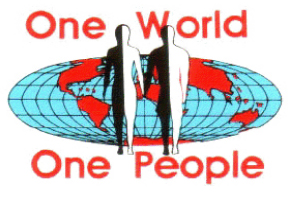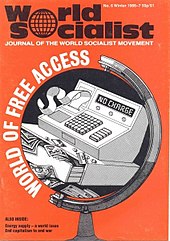
Marxism–Leninism is a communist ideology that became the largest faction of the communist movement in the world in the years following the October Revolution. It was the predominant ideology of most communist governments throughout the 20th century. It was developed in Russia by Joseph Stalin and drew on elements of Bolshevism, Leninism, Marxism, and the works of Karl Kautsky. It was the state ideology of the Soviet Union, Soviet satellite states in the Eastern Bloc, and various countries in the Non-Aligned Movement and Third World during the Cold War, as well as the Communist International after Bolshevization.
Socialism is an economic and political philosophy encompassing diverse economic and social systems characterised by social ownership of the means of production, as opposed to private ownership. It describes the economic, political, and social theories and movements associated with the implementation of such systems. Social ownership can take various forms, including public, community, collective, cooperative, or employee. As one of the main ideologies on the political spectrum, socialism is considered the standard left wing ideology in most countries of the world. Types of socialism vary based on the role of markets and planning in resource allocation, and the structure of management in organizations.
Bolshevism is a revolutionary socialist current of Soviet Leninist and later Marxist–Leninist political thought and political regime associated with the formation of a rigidly centralized, cohesive and disciplined party of social revolution, focused on overthrowing the existing capitalist state system, seizing power and establishing the "dictatorship of the proletariat".

A communist state, also known as a Marxist–Leninist state, is a one-party state in which the totality of the power belongs to a party adhering to some form of Marxism–Leninism, a branch of the communist ideology. Marxism–Leninism was the state ideology of the Soviet Union, the Comintern after its Bolshevisation, and the communist states within the Comecon, the Eastern Bloc, and the Warsaw Pact. After the peak of Marxism–Leninism, when many communist states were established, the Revolutions of 1989 brought down most of the communist states; however, Communism remained the official ideology of the ruling parties of China, Cuba, Laos, Vietnam, and to a lesser extent, North Korea. During the later part of the 20th century, before the Revolutions of 1989, around one-third of the world's population lived in communist states.
Socialist Studies is the name of a quarterly socialist periodical and of the group which publishes it. The group was founded in 1991 by sixteen expelled members of the Socialist Party of Great Britain (SPGB) who claim that their expulsions were the result of an anti-socialist conspiracy. Though small, the group has remained an active and vocal critic of the SPGB since its inception.

The World Socialist Party of India (WSPI) is an Indian political party founded in 1995.
The theory of state monopoly capitalism was initially a Marxist thesis popularised after World War II. Lenin had claimed in 1916 that World War I had transformed laissez-faire capitalism into monopoly capitalism, but he did not publish any extensive theory about the topic. The term refers to an environment where the state intervenes in the economy to protect larger monopolistic or oligopolistic businesses from threats. As conceived by Lenin in his pamphlet of the same name, the theory aims to describe the final historical stage of capitalism, of which he believed the Imperialism of that time to be the highest expression.

The World Socialist Party of the United States (WSPUS) is a socialist political organization that was established in Detroit, Michigan as the Socialist Party of the United States in 1916 and which operated as the Socialist Educational Society in the 1920s before being renamed the Workers' Socialist Party. The organization reemerged in the 1990s and exists today as the American companion party of the World Socialist Movement.
Communism is a sociopolitical, philosophical, and economic ideology within the socialist movement, whose goal is the creation of a communist society, a socioeconomic order centered around common ownership of the means of production, distribution, and exchange that allocates products to everyone in the society based on need. A communist society would entail the absence of private property and social classes, and ultimately money and the state.

Before the perestroika Soviet era reforms of Gorbachev that promoted a more liberal form of socialism, the formal ideology of the Communist Party of the Soviet Union (CPSU) was Marxism–Leninism, a form of socialism consisting of a centralised command economy with a vanguardist one-party state that aimed to realize the dictatorship of the proletariat. The Soviet Union's ideological commitment to achieving communism included the national communist development of socialism in one country and peaceful coexistence with capitalist countries while engaging in anti-imperialism to defend the international proletariat, combat the predominant prevailing global system of capitalism and promote the goals of Russian Communism. The state ideology of the Soviet Union—and thus Marxism–Leninism—derived and developed from the theories, policies, and political praxis of Marx, Engels, Lenin, and Stalin.
Marxism is a method of socioeconomic analysis that originates in the works of 19th century German philosophers Karl Marx and Friedrich Engels. Marxism analyzes and critiques the development of class society and especially of capitalism as well as the role of class struggles in systemic, economic, social and political change. It frames capitalism through a paradigm of exploitation and analyzes class relations and social conflict using a materialist interpretation of historical development – materialist in the sense that the politics and ideas of an epoch are determined by the way in which material production is carried on.
Democratic socialism is a left-wing set of political philosophies that supports political democracy and some form of a socially owned economy, with a particular emphasis on economic democracy, workplace democracy, and workers' self-management within a market socialist, decentralised planned, or democratic centrally planned socialist economy. Democratic socialists argue that capitalism is inherently incompatible with the values of freedom, equality, and solidarity and that these ideals can only be achieved through the realisation of a socialist society. Although most democratic socialists seek a gradual transition to socialism, democratic socialism can support revolutionary or reformist politics to establish socialism. Democratic socialism was popularised by socialists who opposed the backsliding towards a one-party state in the Soviet Union and other nations during the 20th century.
State socialism is a political and economic ideology within the socialist movement that advocates state ownership of the means of production. This is intended either as a temporary measure, or as a characteristic of socialism in the transition from the capitalist to the socialist mode of production or to a communist society. State socialism was first theorised by Ferdinand Lassalle. It advocates a planned economy controlled by the state in which all industries and natural resources are state-owned.
Impossibilism is a Marxist theory that stresses the limited value of political, economic, and social reforms under capitalism. As a doctrine, impossibilism views the pursuit of such reforms as counterproductive to the goal of achieving socialism as they stabilize, and therefore strengthen, support for capitalism. Impossibilism holds that reforms to capitalism are irrelevant or outright counter-productive to the goal of achieving socialism and should not be a major focus of socialist politics.

The Socialist Party of Great Britain (SPGB) is a socialist political party in the United Kingdom. Founded in 1904 as a split from the Social Democratic Federation (SDF), it advocates using the ballot box for revolutionary purposes and opposes both Leninism and reformism. It holds that countries which claimed to have established socialism had only established "state capitalism" and was one of the first to describe the Soviet Union as state capitalist. The party's political position has been described as a form of impossibilism.
Orthodox Marxism is the body of Marxist thought which emerged after the deaths of Karl Marx and Friedrich Engels in the late 19th century, expressed in its primary form by Karl Kautsky. Kautsky's views of Marxism dominated the European Marxist movement for two decades, and orthodox Marxism was the official philosophy of the majority of the socialist movement as represented in the Second International until the First World War in 1914, whose outbreak caused Kautsky's influence to wane and brought to prominence the orthodoxy of Vladimir Lenin. Orthodox Marxism aimed to simplify, codify and systematize Marxist method and theory by clarifying perceived ambiguities and contradictions in classical Marxism. It overlaps significantly with Instrumental Marxism.
Reformism is a political tendency advocating the reform of an existing system or institution – often a political or religious establishment – as opposed to its abolition and replacement via revolution.
A socialist state, socialist republic, or socialist country, sometimes referred to as a workers' state or workers' republic, is a sovereign state constitutionally dedicated to the establishment of socialism. The term communist state is often used synonymously in the West, specifically when referring to one-party socialist states governed by Marxist–Leninist communist parties, despite these countries being officially socialist states in the process of building socialism and progressing toward a communist society. These countries never describe themselves as communist nor as having implemented a communist society. Additionally, a number of countries that are multi-party capitalist states make references to socialism in their constitutions, in most cases alluding to the building of a socialist society, naming socialism, claiming to be a socialist state, or including the term people's republic or socialist republic in their country's full name, although this does not necessarily reflect the structure and development paths of these countries' political and economic systems. Currently, these countries include Algeria, Bangladesh, Guyana, India, Nepal, Nicaragua, Sri Lanka and Tanzania.
The World Socialist Party (Ireland), founded as the Socialist Party of Ireland in 1949 before changing its name a decade later, was a Marxist political party in the impossibilist tradition. It was a companion party of the World Socialist Movement (WSM) and was closely connected to the Socialist Party of Great Britain (SPGB). The party's offices were in Belfast and it was most active in Northern Ireland, although it was also active in the Republic of Ireland. The party participated in elections in Northern Ireland, but without success. Socialist View was the party's newspaper. The party disbanded in the 1990s.







